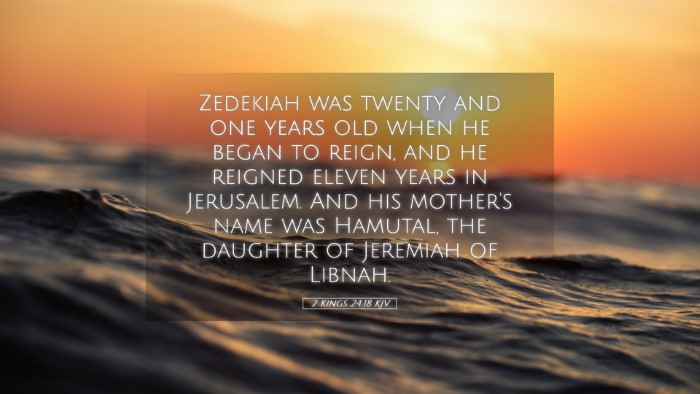Old Testament
Genesis Exodus Leviticus Numbers Deuteronomy Joshua Judges Ruth 1 Samuel 2 Samuel 1 Kings 2 Kings 1 Chronicles 2 Chronicles Ezra Nehemiah Esther Job Psalms Proverbs Ecclesiastes Song of Solomon Isaiah Jeremiah Lamentations Ezekiel Daniel Hosea Joel Amos Obadiah Jonah Micah Nahum Habakkuk Zephaniah Haggai Zechariah Malachi2 Kings 24:18
2 Kings 24:18 KJV
Zedekiah was twenty and one years old when he began to reign, and he reigned eleven years in Jerusalem. And his mother's name was Hamutal, the daughter of Jeremiah of Libnah.
2 Kings 24:18 Bible Commentary
Commentary on 2 Kings 24:18
Verse Reference: 2 Kings 24:18 - "Zedekiah was eighteen years old when he became king, and he reigned in Jerusalem for eleven years. His mother's name was Hamutal daughter of Jeremiah; she was from Libnah."
Introduction
This verse introduces Zedekiah, the last king of Judah, whose reign is marked by political instability and the impending judgment of God against Jerusalem. Zedekiah’s age and the identity of his mother offer context to his character and the environment of his kingship.
Zedekiah's Ascension to Kingship
Matthew Henry: Henry observes that Zedekiah's rise to power followed a turbulent succession of kings, each contributing to Judah's decline. His elevation as a youth (eighteen years old) suggests a king thrust into leadership amidst national crisis, indicating potential naivety regarding governance. Henry emphasizes the spiritual implications of his rule, asserting that the age at which he became king reflects his lack of experience in confronting the moral decay of his nation.
Albert Barnes: Barnes notes the political maneuvering that facilitated Zedekiah's ascension, particularly how he was placed on the throne by Nebuchadnezzar after the fall of Jehoiachin. Zedekiah’s dependence on Babylon reflects the geopolitical realities of his reign and underscores the fragility of Judah’s sovereignty during this period. Barnes points out that Zedekiah's compromised position may speak to the broader themes of loyalty versus survival in a morally collapsing society.
The Significance of Zedekiah's Mother
Adam Clarke: Clarke focuses on Hamutal, Zedekiah's mother, suggesting that maternal influences played a significant role in shaping a king’s character. By identifying Hamutal as the daughter of Jeremiah from Libnah, Clarke highlights her likely connections to prophetic traditions. This background may indicate that Zedekiah had access to divine guidance yet failed to heed it, raising questions about the importance of spiritual legacy in leadership roles.
Duration of Reign
Matthew Henry: Henry regards the eleven years of Zedekiah’s reign as a period filled with opportunities for repentance and renewal. However, it also coincides with the decline of Judah, which is marked by Zedekiah's inability to forge decisive action against the backdrop of impending doom. Henry posits that while the reign was not as brief as some of his predecessors, it was ultimately counterproductive due to disobedience to God's word.
Albert Barnes: Barnes elaborates that the eleven years should be seen as both a significant span for governance yet still insufficient for influencing policies aligned with divine will. He asserts that Zedekiah's reign, caught between loyalty to Babylon and internal dissent, ultimately leads to his downfall, revealing the ephemeral nature of political security apart from spiritual fidelity.
Spiritual Implications and Lessons
Adam Clarke: Clarke interprets Zedekiah's kingship as emblematic of the broader spiritual malaise of Judah. He argues that the educational and spiritual opportunities that could have been leveraged during his reign were squandered, leading to disaster. Clarke emphasizes the importance of aligning political leadership with divine direction and counsels that those in authority must turn to God to seek wisdom and guidance.
Concluding Thoughts
Matthew Henry: Conclusively, Henry states that Zedekiah’s narrative serves as a warning to contemporary leaders about the dangers of disobedience to God, stressing that a leader’s spiritual stature affects the entire nation.
Albert Barnes: Barnes reiterates the critical lesson reminding us that reliance on spiritual and ethical foundations is paramount, and Zedekiah’s failure illustrates the eventual consequences of ignoring such truths.
Adam Clarke: In closing, Clarke urges readers to remember that great power carries great responsibility, and the missteps of leaders like Zedekiah can profoundly impact their people’s relationship with God.
Reflection
As we delve into 2 Kings 24:18, we are reminded of the complex interplay between age, authority, backgrounds, and the overarching sovereignty of God in the affairs of man. Zedekiah represents the struggles of those who lead but do not follow God’s precepts. Thus, the divine narrative is not just historical but also a profound theological commentary on obedience, leadership, and the inevitable consequences of personal and collective choices.


